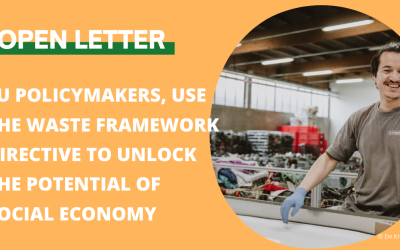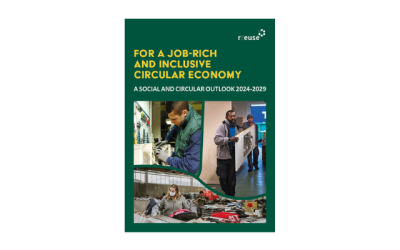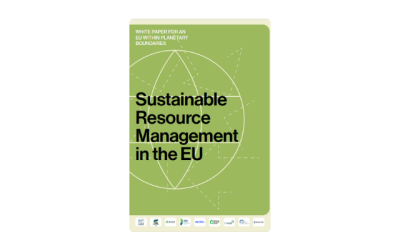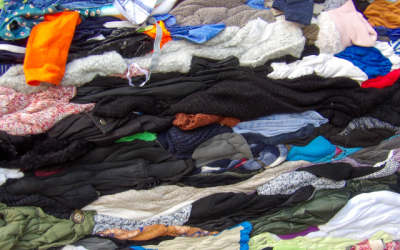Publications
Open letter – Unique Opportunities to Unlock the Potential of Social Economy in Making the Green Transition a Just One
Over 80 leaders from international networks, NGOs, and national organisations from 18 European countries have joined their voices in an open letter. Focusing on the urgent issue of textile waste, RREUSE and co-signatories call on policy makers to unlock the potential...
For a Job-rich and Inclusive Circular Economy – A Social and Circular Outlook 2024 – 2029
Ahead of the European Parliament elections scheduled for 6-9 June, 2024, RREUSE is proud to unveil its manifesto, "A Social and Circular Outlook for 2024-2029." Our manifesto sets out a comprehensive roadmap for a prosperous European Union that embraces an equitable...
Feedback to the European Social Fund Plus (ESF+) – mid-term evaluation
The European Social Fund+ is a key funding instrument for re-use and repair social enterprises in Europe. On the ground, it supports the RREUSE network’s social enterprises in their missions of combating poverty and promoting social inclusion, employment and...
White Paper on Sustainable Resource Management in the EU
It is imperative that we take immediate action to address the rampant over-consumption of resources that the current EU law fails to address. We must recognise this issue, as the consumption of resources is expected to soar in the coming years. Therefore, the...
Guiding Principles on textiles collection and management
The Waste Framework Directive (WFD) revision and the development of end-of-waste (EoW) criteria for textile waste will impact the EU, affecting social enterprises that manage textile collection and waste. RREUSE has developed guiding principles for policy makers to consider, accounting for national contexts and the essential role social enterprises play in preventing premature recycling of reusable goods, creating jobs, and generating income for local communities.
RREUSE answers the call for evidence on the European Social Fund 2014-2020 Ex-post evaluation
RREUSE acknowledges the crucial role of the European Social Fund in providing fairer job opportunities and living standards for over 110,000 workers in more than 1,100 social enterprises of the wide RREUSE Network. While we encourage ESF to build upon its good track record we also provide recommendations to enhance social enterprise support.
RREUSE’s Feedback to the 2023 Targeted Revision of the Waste Framework Directive
RREUSE supports the proposed revision of the Waste Framework Directive, as it recognises the significant role of social enterprises in promoting textile re-use. However, further clarification and improvements are necessary to enhance the effectiveness and ambition of the legislation, particularly concerning the upcoming Extended Producer Responsibility (EPR) schemes on textiles.
Letter to support the consideration for social and due diligence aspects under the Ecodesign for Sustainable Products Regulation
With this letter, RREUSE and 16 partner organisations call on EU Member States and the Council to support the provisions on the social and due diligence dimensions of the ESPR, which were approved by a large majority of the European Parliament in July 2023.
Social and Circular Economy Policies in the European Semester: Lessons from the 2022 Cycle
The European Semester process has gradually gained prominence as a monitoring mechanism for several EU objectives. While the 2022 European Semester cycle is moving in the right direction, a more robust social component is imperative. The European Commission should not miss its potential to steer Member States to prioritise developing the social economy and designing green policies to achieve a socially fair and just transition.
Joint Position paper on the Revision of the Directive on Waste from Electrical and Electronic Equipment (WEEE)
The demand for Electrical and Electronic Equipment devices is on the rise. However, this demand is depleting valuable resources while leading to high energy consumption. The current Waste from Electrical and Electronic Equipment Directive (WEEE Directive) is no longer fit for purpose. Along with other environmental organisations in Europe, RREUSE has produced a joint position paper with ten recommendations to revise, expand and update the existing Directive and alleviate these issues.
Joint Statement on Extended Producer Responsibility for Textiles
RREUSE, along with 10 other NGOs and business associations, urges EU lawmakers to incorporate waste prevention and local re-use as guiding principles into future EPR schemes for mandatory textile separate collection.
RREUSE answers the public consultation on the evaluation of the WEEE Directive
As the amount of waste from electrical and electronic equipment (WEEE) grows rapidly, regulatory interventions in this area are ever more relevant. Therefore RREUSE eagerly took the opportunity to engage in the public consultation on the evaluation of the WEEE Directive. This is a vital piece of legislation shaping the management of electronic waste in the EU.













